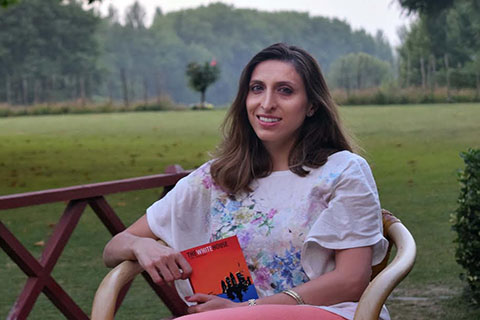Shama Naqushbandi was born in London in 1983 to parents of Kashmiri heritage. After graduating from Clare College, Cambridge University, she joined one of the world’s premier international law firms and has since been working in the city. In the summer of 2011, Shama took a sabbatical to write The White House, her first book which won the ‘Best Novel’ in the Brit Writers’ Awards, 2012.
Shama was recently in Srinagar and spoke about her book that reflects on the idea of home and juggling between multiple identities and cultures.
You were recently in Kashmir and also did a small book reading in a cafe in Srinagar. Tell us about your novel and how you came to write it?
Yes, it was a real pleasure to have such an opportunity. I’d describe The White House as a coming of age story about trying to find home in the 21st century. It is told through the lens of the narrator, Liyana, a character born in England but of Kashmiri heritage, who juggles multiple identities, and it is about her journey through different cultures, places, times and ultimately even people to try to find her place in the world. I wrote The White House because I felt it was a story that needed to be told and one that is very important and relevant for our time. With all the advances in technology, communication, travel and globalisation, I believe the subject of identity has become increasingly complex. Whether we like it or not, we are exposed to so much more in today’s world and this presents challenges when it comes to concepts of home. This is why Liyana’s odyssey is universal and her story resonates with everyone because it is a tale about wanting to belong and find love in a fundamentally broken world, a world that constantly divides, reduces and demands us to choose allegiances even when the very modes of categorisation fall short of the realities they try to contain. I also think the female perspective shines a different spotlight on the diaspora experience, because it is a voice that is often not heard.
Your book explores the idea of home in the 21st century, and your frequent visits to Kashmir over the years, of growing up in London while also being emotionally attached to the valley reflect in the narration of the protagonist. Did writing this novel from the distance in London help you make peace with the memories of home?
Where is home? This is the ultimate question or challenge of the book. I penned The White House across many different geographical locations, including London and Kashmir. The very style of the book is influenced by writers across a rich and diverse literary tradition, from the ancient epic poets Homer and Virgil to the classical English writers who I studied during my time at Cambridge like Hardy and Shakespeare, to impressionist French poets, post-colonial writers and Kashmiri poets such as Agha Shahid Ali. Even the creative process reinforces the rootlessness of the narrative. I think it was perhaps travelling that ultimately helped me make peace with the meaning of ‘home’. Simply being a traveler, a wanderer, endows you with new perspectives that can be incredibly empowering. The White House is itself an odyssey replete with metaphors of travel, and Liyana is the quintessential go-between. The reader travels intimately with her, experiencing her growth alongside her. One of my favourite parts of the book relates to Liyana’s revelation of being a passenger in a taxi – the ultimate ferrier home of human traffic.
You have grown up in London and traveled across the world to many countries. How do you see the response of the outside world to the political and human rights situation in Kashmir? What is the role of international community in calling for a peaceful resolution to the Kashmir dispute that can somewhat ease the suffering of Kashmiri people who bear the brunt of this decades-old unresolved issue?
I think it would be wrong for me as an outsider and someone who does not live in the Valley to pontificate about the political solution for Kashmir – I think that is best left to the Kashmiri people. The situation in Kashmir is of course desperately tragic because of the human cost involved, and I think it is incumbent on us at a human level to advocate truth, justice and reconciliation to bring about peace. As for the outside world, my personal experience has been that many people have limited knowledge about the realities on the ground in Kashmir. Sadly, I think this also extends to people within the rest of India. I often find it difficult to talk about Kashmir without individuals already having their own emotions and prejudices attached to it. It is as if everyone’s map of Kashmir is different and I draw on this idea in my book. I always encourage people to visit the Valley with an open mind and judge Kashmir for themselves.
How do you look at the emergence of young writers in Kashmir who are also writing in English, finding their own voice and telling their own stories to the outside world?
I think it is incredibly exciting. I’ve always supported art coming from Kashmiris themselves, particularly because I think Kashmir has a long history of being over-represented and often misrepresented, misappropriated and sensationalised by outsiders. It is fantastic that there is so much talent coming through the pipeline, particularly amongst the younger generation, and Kashmiris are now finding their own voices and writing back. I’ve always said Kashmir is the perfect palette for an artist – there is so much inspiration and emotion to draw from. If you speak to people in the Valley, almost every other person is a poet, painter or philosopher. Everyone has a story to tell, and it is just a question of time before people have to start listening.

